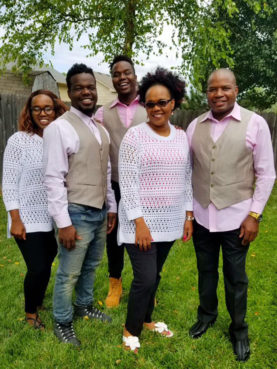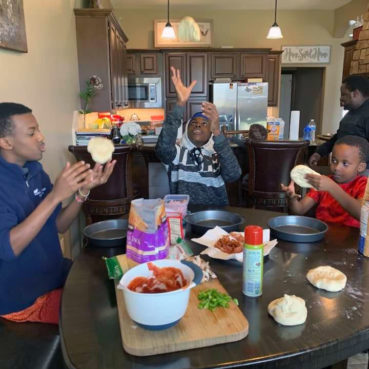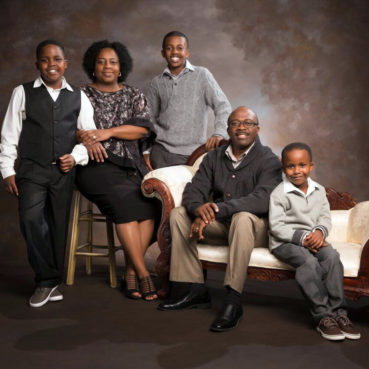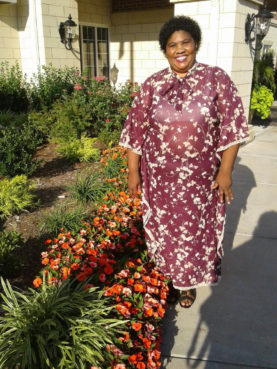WICHITA, Kan. (RNS) — Mirriam Oyugi planned on having her two sons at home for Easter and was eager to make all of their favorite Kenyan dishes. When their travel plans were hindered due to the pandemic, Oyugi said, her sons opted for cooking lessons instead.
“I taught my boys how to make chapatis on Easter,” Oyugi said. “We did it on video and went through the whole process together. They made theirs and I made mine. I think they had a great time!”
The Kenyan community in this Midwestern state is a close-knit group, with most of its members sharing in common their Christian faith. Protestant church membership in the community is normal, and many Kenyans come together in houses of worship to foster a sense of diaspora community.

Mirriam Oyugi, center, with her family. Courtesy photo
During holidays and celebrations, they usually gather together in parks and at people’s homes, eating traditional Kenyan foods such as nyama choma (roasted meat), ugali (maize) and one of the most beloved East African dishes, chapati (unleavened flatbread). This year, of course, is looking a little different due to the coronavirus pandemic, and many Kenyans in Wichita are struggling to find ways to fellowship, a need that is heightened for those who may already feel displaced and far from family. But, like so many others around the globe, they’ve turned to technology to bring them together.
Oyugi said that since Easter, the family has made chapatis via video twice more. She said that although the family can’t be together in person, they are still as connected as ever.
“Something good came out of this,” Oyugi said. “I have some boys who can make very good chapatis.”
Many Kenyans began immigrating to the United States in the 1960s, according to members of the community. At the time, the Kenyan government was advocating for more Kenyans to pursue educational opportunities, leading to scholarships for further studies at U.S. universities. Kenya is among the top five countries with the largest number of African immigrants in the United States, with approximately 136,000 Kenyans widely dispersed across the country, according to Pew Research.
Breakthrough Community Church is a vibrant, Pentecostal congregation in southeast Wichita with approximately 50 members, headed by Kenyan pastor Anthony Macari. The church is known for incorporating both Swahili and English songs with traditional Kenyan beats to create a compelling worship experience for its congregants. Amid the pandemic, the church switched to virtual services on March 22 and there are no current plans to resume in-person services due to restrictions on large gatherings.
In addition to church, people in the community such as Jane Njagi have been taking to Facebook Live to share personal recipes for more complex Kenyan dishes, like mukimo (mashed vegetables) and mandazis (fried bread).
“We are still together, but not together physically, so people are still communicating through social media,” Njagi said. “That is how people have been staying busy.”

Jane Njagi’s sons, Jessie, from left, Joel and Justin, make homemade pizza in Wichita, Kansas. Courtesy photo
At home, Njagi said her three young sons have been helping in the kitchen more than ever.
“It’s bringing a certain togetherness,” Njagi said. “One of my sons is now a professional baker.”
Her family has also taken on a new experiment: learning to cook American food.
“The other day, we made pizza from scratch,” Njagi said. “I’ve been in the United States for almost 20 years and I have never made pizza from scratch. That was very interesting.”
Many Kenyans are also taking to traditional remedies to keep themselves healthy, like mixing hot water, lemon, ginger and honey.
“Herbal remedies have been there since time immemorial,” said Barack Nyakudi. “That was our way of treating people when we didn’t have medications.”
Many in the Kenyan community are using WhatsApp to continue fellowshipping in isolation, according to Marie Macari, first lady of Breakthrough Church.
“We have WhatsApp groups for the entire church and for the women,” Marie Macari said. “We are putting Bible verses there to encourage each other.”
Njagi said that while quarantine has been increasingly difficult in a time when community members need each other more than ever, the app has been used to fill in the gap of physical connection.
“One of the people had a death in the family,” Njagi said. “They communicated through WhatsApp and people got together and contributed.” (It is a custom for Kenyans to offer financial support in times of death, to cover funeral costs and other expenses.)

The Njagi family. Courtesy photo
As the world struggles to deal with the realities of the coronavirus, many Kenyans are praising God for his protection. The number of coronavirus cases in Kenya is surprisingly low, although it is beginning to increase. On Wednesday (May 27), for the first time, Kenya recorded a three-digit increase in new cases over a 24-hour period, taking the national tally to 1,471. There have been 55 COVID-19 deaths in the country of 50 million people.
More than 80% of the Kenyan population identifies as Christian, according to Pew Research — and religion is playing a significant role in the community’s reaction to the pandemic.
“I think that the heart of God is on Kenya,” Oyugi said. “The Bible says that God cannot give you more than you can handle. Imagine if what we are seeing in other countries like America happens in Kenya. Our country cannot handle that.”
Despite the low number of confirmed cases in Kenya, the virus poses other challenges. Susan Williams said the country’s stay-at-home orders are contributing to other forms of suffering.
“People in the villages go to the market each day to get their daily bread,” Williams said. “Now they can’t do that. We thank God that people are not dying but there are also people going to bed hungry.”
Despite the external hardships the virus has brought upon the country, many feel the relatively low number of deaths is also evidence of God’s hand on Kenya. Williams said prayers for protection from the virus have had a significant impact on the lack of spread across the country.
“Melinda Gates said ‘Africans will see dead bodies in the streets,’” Williams said. “We haven’t seen that. People have been praying really hard and fasting about it. There is power in spoken word. Our faith has seen us through, I can say that for sure.”

Teresia Wambugu at her home in Wichita, Kansas. Courtesy photo
Some in the Wichita Kenyan community are embracing the stay-at-home orders and using this time to strengthen their relationship with God.
“I have been reading my Bible several times a day,” Oyugi said. “It is very good to have that personal time with God. Having a relationship with God has been very important.”
Teresia Wambugu said now that socializing has come to a halt, families should focus on spending quality time eating and praying together, which is “the way the Lord wants it.”
“Every weekend, we are cooking to take food to socialize,” Wambugu said. “Now, we’re not going anywhere. But for some people that’s good. We had forgotten about God. Families weren’t eating together. Now, they are home like a family.”
Wambugu said she trusts God to see her community, and the world, through these turbulent times.
“God will protect us,” Wambugu said. “He’ll hide and cover us with his blood, even if we have masks or we don’t. The blood of Jesus can cover us from head to toe.”





